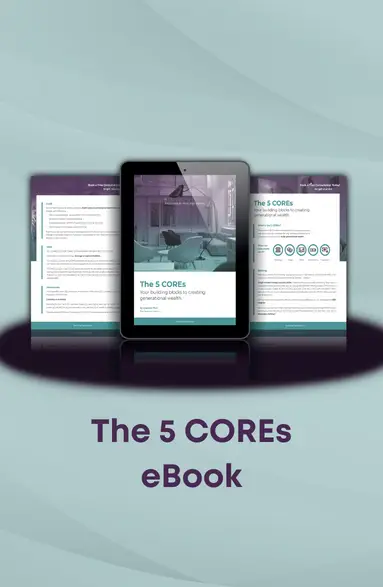In my financial journey, I’ve been…
- The person who tracks nothing…
- And the person who tracked EVERYTHING, like the pennies that get adjusted on your credit card interest
The difference between the two?
Different stages in my wealth journey.
At this moment in time, you might be either one of those people depending on where you are in your own financial journey. As you’re building a habit, it’s good to start little by little so that it’s less intimidating. Next would be to experience the complete FULL habit (tracking everything), before scaling back to make it work for you. Because at the end of the day, if you don’t understand the system, then it’s shit either way because it won’t actually help you get a clear picture of where your finances are.
Today, my version of tracking is honestly using the notes app in my phone and Evernote. I have a spreadsheet I occasionally use, but I don’t really track each and every single item anymore. And here’s why…
Our lifestyle and expenses have, what I call, “evened out”. We use our tracking as an indicator/check in of how we’re doing. If needed, I will go back through the last few months to see exactly what I’ve spent – but, I’m not going to go through all that extra work if I don’t NEED to. PS – this is a system that works for US!
I do not know your financial situation, so if you were to start, I’d recommend marking down all your expenses because the worst thing that will happen is you realize how much you’re actually spending per month and on what. Not a bad way to start getting some clarity around your spending habits if you ask me…
Make it a practice, and learn to love YOUR process.
What are expenses?

Expenses are essentially ANY bill you have to pay. This includes subscriptions, rent, car, utilities, and also what you eat, toothpaste (some people don’t count this but as COVID taught us – toilet paper is also an expense).
Most of us look at expense as something we spend money on, but I’d also challenge you to see what your time expenses are? As in, what are the items that you’re spending perhaps too much time on or more time than you’d prefer – because there’s a human element and price attached to that as well. It may not be in dollars, but could very well be spent with your mental health.
For example, I love binging TV shows when I get the chance to relax and do nothing. However, I can’t EVER actually binge for too long because I literally feel like my brain turns to mush. I need something in between to distract me before I can continue. The expense in that scenario is my mental health and well being.
Why is it important to keep track of your income and expenses?

If you don’t have a clear picture of the current state of your financial situation, it is very difficult to get to your next level. You’ll aimlessly “try to retire” or “try to make more money” but never quite actually get there.
Think about tracking your income and expenses as your navigation system. It’s the dials and the numbers that are there for you to reference back to in times of need/confusion. It’s something that will allow you to course correct when needed and help reduce your stress surrounding money.
It’s good practice. And when it comes to wealth creation, it takes practice. It’s not something that many of us master overnight. By taking the time to apply the skills you’re learning, you’ll master the concept of cashflow by keeping your eye on what’s coming in (your income) and what’s going out (your expenses).
If you’re a visual learner, it’ll help tremendously to be able to look at a budget and plan for your financial goals.
It helps all parties involved when you’re able to paint the picture clearly because, oftentimes in families, our finances aren’t solo anymore. It’s beneficial to set a “meeting” with your partner or even kids and get them involved so they can watch and observe your logic behind money and start them young.
Remember, wealth is about becoming and not just a checklist of to-dos.
What are the 3 types of expenses?

This is an important point in how we look at “expenses” because there’s more to it than “just the bills” you have to pay. Knowing the type of expenses you have can help you better plan so you never have to dip into your savings or worse, your bad debt.
The 3 types of expenses are fixed, variable, and periodic (there’s a 4th too called “discretionary” spending cause we’re human and I love food too much). Below are some examples per category.
- Fixed Expenses: Rent, Car Payments, Subscriptions, Bank Fees (these are fixed amounts that can be changed or are not often changed)
- Variable Expenses: Groceries, Gas, Bank Fees (I included bank fees again because if you’re dipping into overdraft, the interest you have to pay back will vary)
- Periodic: Car maintenance (oil changes), household maintenance (furnace filters, cleaners, renovations)
Discretionary Expenses: What I like to call things you don’t need but want anyways. (takeout, fine dining, candy, slurpees, household items (like fancy soap – when you know you can get the basic ones)
Start Practicing your habits!
If I haven’t already drilled it into you through this blog, let’s do it one last time for good measure:
Start-tracking-your-expenses!
When you first start, you don’t have to track everything per say. To ease the overwhelm, start with the area that you feel most stressed about or have a concern. If it’s shopping, then look at creating categories within your shopping.
Once you have that figured out and feel more comfortable with the skill, then expand and try to track everything at least one point in your journey. It doesn’t mean you’ll have to do it forever, but if you’ve never gotten a complete 360 view of your finances, it’s time you do so.
Finally, once you’ve mastered the skill, the fun part is making it work for yourself and making tweaks as needed to hit your goals!







